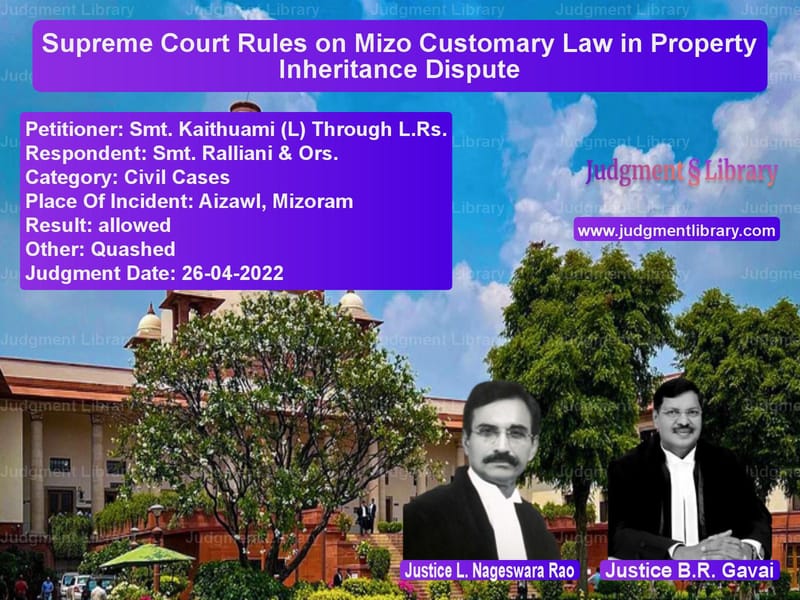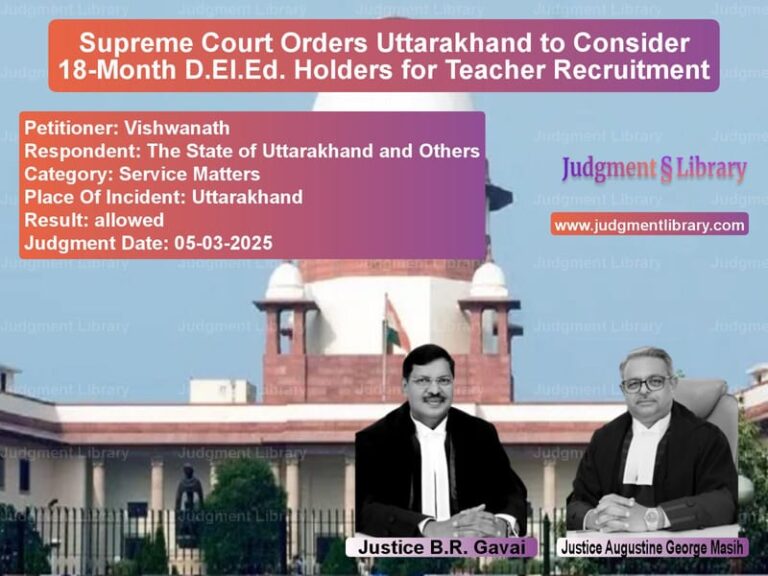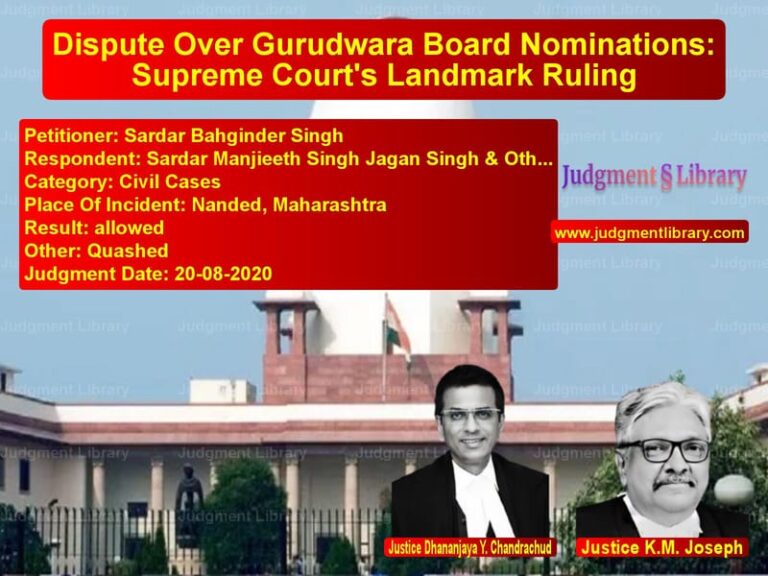Supreme Court Rules on Mizo Customary Law in Property Inheritance Dispute
The Supreme Court of India recently delivered a significant ruling in Smt. Kaithuami (L) Through L.Rs. vs. Smt. Ralliani & Ors., concerning the inheritance of ancestral property under Mizo Customary Law. The case revolved around a dispute regarding the succession rights of daughters and granddaughters in a Mizo family, addressing crucial issues of customary inheritance rights, responsibilities, and property division.
Background of the Case
The dispute arose from the inheritance of property originally belonging to P.S. Dahrawka, who was married to Smt. Kaithuami. The couple had ten children, including two sons and eight daughters. However, one son and one daughter died at a young age, leaving the surviving heirs.
The property in question was allegedly purchased jointly by P.S. Dahrawka and Kaithuami in 1945, but official records indicated that it was acquired in the name of P.S. Dahrawka alone in 1972. After his death in 1978, disputes arose regarding the rightful heirs to the property.
Initially, the only surviving son, Thanhnuna, applied for a heirship certificate, citing the Mizo Customary Law, which traditionally grants property inheritance rights to the youngest son. However, he died in 1996, leaving behind his widow Ralliani and two daughters, Laldinpuii and Lalmuanpuii.
Following his death, Kaithuami contested the inheritance claim and sought recognition as the legal heir. This dispute led to multiple rounds of litigation in the Subordinate District Council Court, Aizawl, and ultimately reached the Supreme Court.
Legal Issues
- Whether the property should be inherited solely by the youngest son under Mizo Customary Law.
- Whether Kaithuami, as the surviving spouse, had a right to inherit her deceased husband’s property.
- Whether the responsibility of taking care of parents plays a role in determining inheritance under Mizo Customary Law.
- Whether the daughters of Thanhnuna (the deceased son) had any inheritance rights.
Arguments by the Parties
Appellant’s Arguments (Kaithuami’s Legal Heirs)
- The appellants argued that inheritance under Mizo Customary Law depends not only on blood relation but also on the responsibility carried by the legal heir.
- They contended that Thansangi Huha, the youngest daughter, had taken care of her mother, Kaithuami, in her old age, thereby earning a right to inherit the property.
- The appellants cited an agreement between P.S. Dahrawka and Kaithuami in 1927, wherein they mutually agreed to inherit each other’s property.
Respondents’ Arguments (Ralliani & Daughters of Thanhnuna)
- The respondents contended that under Mizo Customary Law, the youngest son is the rightful heir, and in his absence, his legal heirs (widow and daughters) inherit the property.
- They argued that Kaithuami had no independent claim over the property as it was registered in the name of P.S. Dahrawka alone.
- They asserted that the 1927 agreement had no legal bearing on the current dispute.
Supreme Court’s Judgment
Key Observations
- The Supreme Court ruled that inheritance under Mizo Customary Law is not solely based on gender or birthright but also on the responsibility carried by the heir.
- The Court acknowledged that Kaithuami had inherited her husband’s property in her lifetime, and Thansangi Huha (the youngest daughter) had returned home after her divorce and taken care of her mother.
- The Court referred to previous judgments, emphasizing that Mizo Customary Law allows the responsible heir (one who takes care of aged parents) to inherit property.
- It held that Lalmuanpuii, the unmarried granddaughter, also had a rightful claim to a share in the property.
Final Decision
The Supreme Court set aside the Gauhati High Court’s ruling and reinstated the judgment of the District Council Court, Aizawl, which had divided the property between Thansangi Huha and Lalmuanpuii.
“Inheritance under Mizo Customary Law does not follow strict patriarchal succession but considers responsibility and support provided to aged parents.”
Implications of the Judgment
For Mizo Customary Law
- The ruling reinforces that property inheritance is not strictly male-centric but also considers familial responsibilities.
- It sets a precedent for acknowledging the role of divorced daughters in inheritance if they return home to care for their parents.
For Gender Equality in Property Rights
- The judgment ensures that daughters and granddaughters can inherit property under specific circumstances.
- It establishes that women who take care of aged parents should not be excluded from inheritance.
For Future Inheritance Disputes
- The ruling clarifies that agreements between spouses regarding inheritance may be considered but are not absolute.
- It strengthens the concept that responsibility matters in succession rights.
Conclusion
The Supreme Court’s ruling in Smt. Kaithuami (L) Through L.Rs. vs. Smt. Ralliani & Ors. is a landmark decision clarifying Mizo Customary Law on inheritance. By prioritizing the role of responsibility over traditional gender-based inheritance, the Court has ensured that justice is served in a way that aligns with the customs while also promoting equity. This ruling will serve as a guiding principle for similar inheritance disputes in the Mizo community and beyond.
Petitioner Name: Smt. Kaithuami (L) Through L.Rs..Respondent Name: Smt. Ralliani & Ors..Judgment By: Justice L. Nageswara Rao, Justice B.R. Gavai.Place Of Incident: Aizawl, Mizoram.Judgment Date: 26-04-2022.
Don’t miss out on the full details! Download the complete judgment in PDF format below and gain valuable insights instantly!
Download Judgment: smt.-kaithuami-(l)-t-vs-smt.-ralliani-&-ors.-supreme-court-of-india-judgment-dated-26-04-2022.pdf
Directly Download Judgment: Directly download this Judgment
See all petitions in Property Disputes
See all petitions in Succession and Wills
See all petitions in Landlord-Tenant Disputes
See all petitions in Judgment by L. Nageswara Rao
See all petitions in Judgment by B R Gavai
See all petitions in allowed
See all petitions in Quashed
See all petitions in supreme court of India judgments April 2022
See all petitions in 2022 judgments
See all posts in Civil Cases Category
See all allowed petitions in Civil Cases Category
See all Dismissed petitions in Civil Cases Category
See all partially allowed petitions in Civil Cases Category







